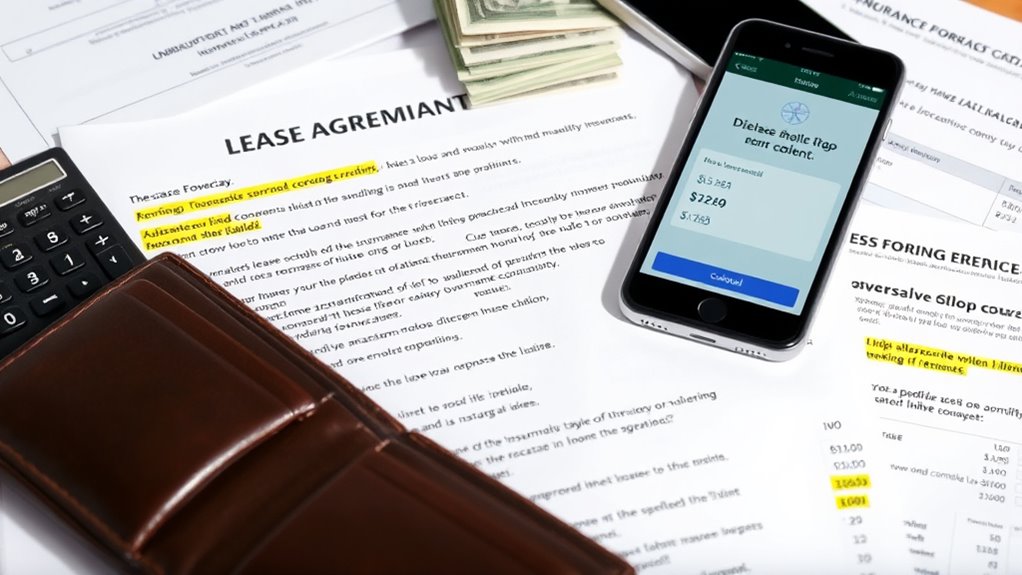Renters insurance typically covers stolen cash, but with strict limits—usually $200 regardless of your total coverage amount. You'll need to file a police report within 24-72 hours and provide documentation like bank withdrawal receipts to support your claim. The theft must qualify as a named peril, and your deductible will apply. Consider whether filing a small cash claim is worth the potential 10-20% premium increase you might face afterward. Uncover smarter protection alternatives below.
How Much Cash Does Renters Insurance Typically Cover?

The $200 limit is the standard ceiling for cash coverage in most renters insurance policies. This sublimit applies regardless of your total personal property coverage amount, which might be $20,000 or more.
Most renters insurance policies cap cash coverage at just $200, even with $20,000+ in total property protection.
When thieves steal cash from your rental, insurers strictly enforce this cap per claim.
The theft limits for cash also extend to similar monetary instruments including foreign currencies, coins, bullion, stored value cards, and bank notes. These restrictions are consistently applied across major insurance providers, though slight variations exist. Cash theft claims require submission of a police report before an insurance provider will process your claim.
For instance, Texas policies often limit cash coverage to just $100.
Cash sublimits function independently from other category-specific caps like those for jewelry or electronics, creating a separate protection threshold for your monetary assets. Remember that your policy's deductible amount will still apply to cash theft claims, potentially making smaller losses impractical to file. Understanding your policy's specific provisions is essential, and you may want to discuss with an insurance agent whether additional coverage is necessary for valuable items beyond standard limits.
When Cash Theft Is Covered Under Your Policy
Your renters insurance coverage for stolen cash depends on whether the theft occurred on or off your insured premises, with different limits applying to each location.
For coverage to apply, the loss must qualify as a named peril theft with clear evidence of unlawful taking without consent rather than mysterious disappearance.
Documentation including police reports, proof of ownership, and evidence of forced entry (when applicable) is essential to successfully file a claim for stolen cash. Most renters insurance policies include specific sub-limits for cash theft, typically ranging from a few hundred dollars. It's important to review your policy details to understand the coverage limits that apply specifically to cash. Cash coverage is generally capped at $200 per claim regardless of how much personal property coverage you have.
On vs. Off Premises
Whether stolen from your apartment or snatched during vacation, renters insurance maintains consistent coverage limits for cash theft regardless of location.
The standard $200 sublimit applies universally for cash losses, reflecting insurers' concerns about moral hazard risks and verification challenges.
For on premises coverage, this limit remains fixed regardless of your total personal property coverage amount.
Theft from both locked and accessible residences qualifies under covered perils, with no deductible required for claims involving cash only.
Off premises limitations mirror the on-premises $200 cap, extending to thefts from vehicles, hotels, or public spaces worldwide. Filing a claim for stolen cash may increase your renters insurance premiums by approximately 25%.
While your general personal property coverage for off-premises belongings typically reduces to 10% of your limit, the $200 cash sublimit remains unchanged, providing consistent but limited protection wherever you go.
Named Peril Requirements
For cash theft coverage to apply under your renters insurance, specific named peril requirements must be satisfied beyond just location considerations. Your policy classifies theft as a named peril, but multiple conditions determine whether your stolen cash claim will be approved.
- Theft must be explicitly listed as a covered peril in your policy document.
- Cash theft claims are subject to strict sublimits (typically $200) regardless of your total coverage.
- Coverage exclusions apply if negligence is proven (unlocked doors, unsecured cash).
- Theft by roommates, household members, or during illegal activities isn't covered.
Implementing proper theft prevention measures is critical, as insurers require evidence that you took reasonable precautions.
Remember to file a police report promptly and maintain documentation proving legitimate ownership of cash to support your claim.
Similar to personal items stolen from vehicles, your cash theft claims will be processed regardless of location as long as they meet the policy requirements.
Documentation Proves Theft
When filing a renters insurance claim for stolen cash, proper documentation serves as the cornerstone of a successful reimbursement process.
Police reports are non-negotiable for claim validation, providing official verification that theft occurred under covered circumstances.
Your insurer will require thorough theft reporting, including itemized lists detailing cash amounts and theft circumstances. Supporting evidence like bank withdrawal receipts, ATM statements, or surveillance footage greatly strengthens your case by establishing cash ownership. Most renters insurance policies provide Actual Cash Value coverage for stolen money unless specified otherwise.
Be aware that insurers scrutinize cash claims carefully to prevent fraud. Documentation must align with your policy's covered perils—typically theft during a verifiable break-in.
Claims lacking proper evidence face likely denial, particularly those exceeding the standard $200 sublimit. Keep in mind that off-premises thefts remain covered but may trigger further verification requirements depending on location risk factors.
Deductibles and Their Impact on Cash Theft Claims
Contrary to standard property loss claims, renters insurance policies generally treat stolen cash differently in relation to deductibles. Most insurers waive deductibles for cash-only claims due to the low sublimits (typically $100-$200) already limiting payouts.
However, when stolen cash is part of a larger theft claim, your deductible applies to the total claim amount, reducing your overall reimbursement.
- Cash-only claims rarely exceed deductible thresholds, explaining why insurers waive them
- Combined claims (cash plus other items) always have deductibles subtracted from total value
- Texas policies face stricter limitations, with cash coverage capped at just $100
- Strategic claim strategies involve weighing potential premium increases against compensation
Understanding these deductible dynamics helps you determine when filing a claim makes financial sense, especially since most insurers calculate payouts using actual cash value for stolen items. Renters insurance typically offers personal liability coverage if injuries occur on your property while your cash is being stolen.
Key Exclusions for Stolen Money Claims

Though many renters believe their insurance fully protects their cash from theft, specific exclusions greatly limit coverage in different scenarios.
You'll find significant cash theft exclusions related to third-party custody situations that often surprise policyholders. Your renters insurance won't cover money stolen by common carriers like airlines or shipping companies during transit. High-value items may require additional coverage beyond your standard policy to properly protect your cash and valuables.
Likewise, policy limitations exclude theft occurring in third-party storage facilities unless you've purchased specific riders. When contractors or cleaning services have access to your home, cash stolen during their service typically falls outside standard coverage.
Another crucial exclusion applies to money taken from checked luggage under airline custody. Most renters insurance policies have a maximum $200 limit for stolen cash reimbursement, regardless of how much was actually taken. Understanding these limitations helps you take appropriate precautions with your cash and avoid disappointment when filing claims for stolen money under circumstances your policy doesn't cover.
Documentation Required for Stolen Cash Claims
Successfully filing a stolen cash claim with your renters insurance company demands thorough documentation to verify both the theft and your ownership of the money. You must file a police report within 24-72 hours of realizing the theft, including specific details about the incident location, time, and entry methods.
- Submit photographs of damage related to the theft (broken locks, damaged safes)
- Provide bank statements or ATM receipts proving cash ownership and recent withdrawals
- Include witness statements from neighbors or roommates who can corroborate theft details
- Complete all insurer-specific claim forms with notarized signatures where required
Insurance companies typically assign a claims adjuster to investigate your stolen cash claim and determine the appropriate reimbursement amount. Keep copies of all theft documentation and communications with your insurer throughout the claims process.
Keep in mind that failing to file a police report will likely result in claim denial, regardless of other evidence provided.
How Filing a Cash Theft Claim Affects Your Premiums

Filing a cash theft claim with your renters insurance typically triggers premium increases of 10-20% that persist for 3-5 years, regardless of the minimal payout you receive due to low cash sublimits.
Your claim-to-payout ratio becomes particularly unfavorable when claiming stolen cash below $200, as you'll face the same premium consequences as larger claims while receiving minimal compensation.
Multiple claims within a 36-month period can compound these effects, potentially resulting in steeper rate hikes of 25-30% or even policy non-renewal if your insurer perceives increased risk.
Premium Increase Percentages
When you submit a renters insurance claim for stolen cash, you'll likely face considerable premium increases that persist for years. The average initial theft claim triggers a 25% rate hike, jumping from $246 to $308 annually, with premium trends showing these raised rates continuing for 3-5 years afterward.
- Filing a second theft claim compounds the problem, adding an additional $73 (totaling a 62% increase)
- Insurer policies vary dramatically – State Farm averages 19% increases while Allstate typically raises rates by 54%
- Nine states with anti-discrimination laws may exempt theft claims from rate calculations
- Claim frequency matters greatly – policyholders with prior claims face steeper increases (35% vs. 25% for first-timers)
These considerable increases make small cash claims financially counterproductive unless your loss greatly exceeds your deductible. Evaluating your credit score beforehand can help you understand potential premium impacts if you decide to file a claim.
Claim-to-Payout Ratio
Despite the immediate financial relief you might seek after cash theft, the claim-to-payout ratio for stolen currency rarely justifies filing an insurance claim.
With most policies capping cash coverage at $200 and deductibles typically ranging from $500-$1,000, you'll often find yourself in a negative financial position.
The math simply doesn't work in your favor: a 25% premium increase following a theft claim compounds over multiple years, far exceeding the maximum $200 payout for cash. Insurance companies typically evaluate your claim history when determining future premiums, making small cash claims particularly disadvantageous.
Smart insurance strategies involve reserving claims for substantial losses where multiple valuable items were stolen alongside cash. Understanding how insurance companies use valuation methods like Actual Cash Value and Replacement Cost Value is crucial when deciding whether to file a claim.
Documentation presents another obstacle, as cash theft claims face heightened scrutiny without receipts or photographic evidence. Taking a detailed home inventory of your possessions can help substantiate other items lost during the same theft event.
Keep in mind that claims remain on your record for 3-7 years, potentially affecting future coverage and rates.
Multi-Year Rate Impact
The financial aftershocks of a cash theft claim reverberate through your insurance premiums for years, often creating a disproportionate cost compared to the original recovery amount. Filing that primary theft claim typically increases your annual premium by 25%, with subsequent claims driving rates up by 55% or more compared to claim-free policies.
- Premium impacts persist for 3-5 years following your claim submission
- CLUE reports track your claim history for 5-7 years across all insurers
- Repeated claims within 36 months notably amplify non-renewal risk
- Claim frequency directly correlates with premium calculation models
Consider the long-term costs before filing: a single cash theft claim might recover $200 but cost $900+ in premium increases over three years.
Alternative protection methods like home safes often provide better financial outcomes than filing small cash theft claims.
Better Ways to Protect Your Cash Than Relying on Insurance

Rather than depending solely on insurance with restrictive cash coverage limits, you'll find greater security through implementing extensive protection strategies.
Utilize FDIC-insured bank safe deposit boxes or UL-rated home safes bolted to structural elements for secure storage of valuables. Consider MactwinBox technology that permanently disables stolen currency. Instead of traditional payments, utilize online payment providers that offer encrypted transactions for greater security and convenience.
Fortify your finances with bank-certified protection systems that render unauthorized currency access completely worthless.
Reduce cash dependency by adopting alternative payments like digital wallets with biometric authentication or ACH transfers that create traceable audit trails. Credit cards provide zero fraud liability for unauthorized transactions, making them the most secure payment option. For necessary transactions, prepaid cards with spending limits minimize risk exposure, while money orders provide fraud-resistant documentation.
Supplement these measures with smart technology: RFID-tagged containers that trigger alarms, GPS-enabled cash boxes for transport monitoring, and blockchain-powered ledgers that create immutable transaction records—all offering protection levels far exceeding standard insurance coverage.
Frequently Asked Questions
Does Renters Insurance Cover Money Stolen From a Roommate?
No, renters insurance doesn't cover money stolen by your roommate. Policies specifically exclude theft by household members or anyone with legal access to your property.
Even when cash theft occurs, roommate theft claims are denied due to these exclusions. You're better off pursuing legal action against your roommate directly.
To protect yourself, establish clear roommate responsibilities beforehand, secure valuables in locked storage, and maintain separate insurance policies to avoid coverage complications.
Can I Increase My Cash Coverage Limit With a Special Rider?
You generally can't increase your cash coverage through standard special riders.
While renters insurance offers scheduled personal property endorsements, these apply to collectible coins and rare currency, not everyday cash.
Insurers design these limitations due to fraud risks and verification challenges.
Your best option for protecting larger cash amounts is using a bank or safe deposit box rather than attempting to insure it through policy modifications.
Are Gift Cards Considered Cash Under Renters Insurance Policies?
Gift cards typically fall under the "cash equivalent" category in most renters insurance policies.
They're generally subject to the same coverage limits as cash, which means they face similar restrictions.
You'll find gift card coverage grouped with money, bullion, and negotiable instruments in your policy's special limits section.
Check your specific policy language, as some insurers may classify gift cards differently or offer endorsements to increase these limits for valuable gift cards.
Does Renters Insurance Cover Cash Stolen During a Natural Disaster?
Yes, your renters insurance typically covers cash stolen during a natural disaster, but standard cash theft limits still apply.
You'll generally receive up to $200 for stolen currency, regardless of the circumstances.
However, natural disaster coverage only extends to covered perils—if your policy excludes flood damage, cash stolen during a flood won't be covered.
Remember to file a police report and provide documentation like bank statements to strengthen your claim.
Will Renters Insurance Cover Cash Stolen by Household Members?
No, your renters insurance won't cover cash stolen by household members.
Standard policies contain specific coverage exclusions for household theft committed by anyone named on your policy, including spouses and dependents.
Insurers classify these incidents as potential fraudulent claims due to verification difficulties. Even with police reports, you'll face significant challenges proving the theft occurred.
To protect yourself, consider keeping cash in a bank account rather than at home.

